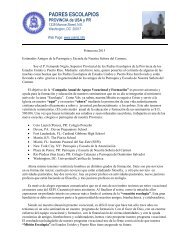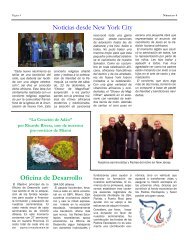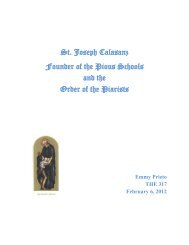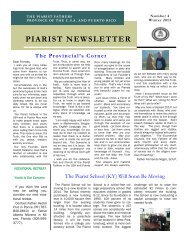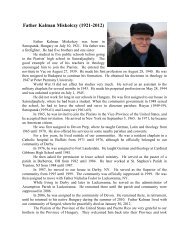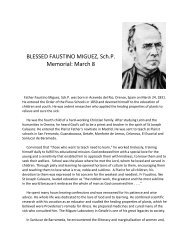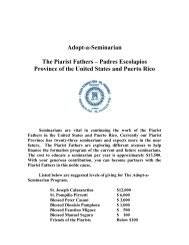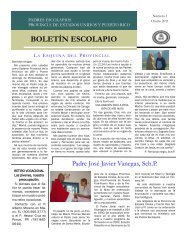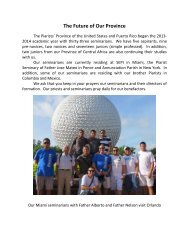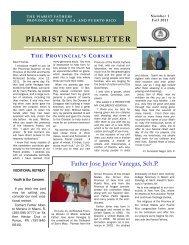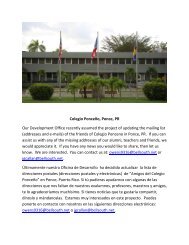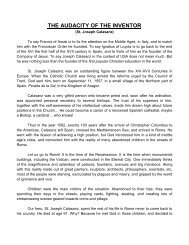Piarist Community Life - The Piarist Fathers
Piarist Community Life - The Piarist Fathers
Piarist Community Life - The Piarist Fathers
You also want an ePaper? Increase the reach of your titles
YUMPU automatically turns print PDFs into web optimized ePapers that Google loves.
<strong>Piarist</strong> <strong>Community</strong> <strong>Life</strong><br />
We all are aware that our religious life is a call to a total consecration of our lives in<br />
Christ, for the Kingdom. This consecration is built upon the experience of our<br />
community life, and it is expressed in our specific mission of evangelizing through<br />
education.<br />
Our <strong>Piarist</strong> Order has clearly stated what our fraternal life should be like:<br />
a. <strong>The</strong> <strong>Piarist</strong> religious lives in community as an active subject and protagonist of<br />
the community and the <strong>Piarist</strong> mission, beyond any individualism and protagonist<br />
ambition.<br />
b. He matches well the personal and community projects in a fruitful dynamic at the<br />
service of the religious and his community.<br />
c. <strong>The</strong> <strong>Piarist</strong> combines unity with autonomy, in a healthy interdependence that<br />
enriches community life. <strong>The</strong>y should not be confounded with fusion, independence,<br />
and anarchy, which are always destructive for both the religious and the community.<br />
d. Dialogue, listening, intimate communication, together with the internal and<br />
external tasks and works, lived with freedom and in fraternal atmosphere, become the<br />
permanent attitudes in which every community lives and evaluates its life. <strong>Community</strong><br />
meetings are important evaluators of <strong>Community</strong> life.<br />
e. <strong>The</strong> superior is an animator more than a manager; at the same time he is not a<br />
paterfamilias of each religious; at times religious life infantilizes its members.<br />
f. Our community life must always be open to the laity, especially those who share<br />
our mission and charism. We invite them to share our prayer, the Eucharistic, our<br />
meals, in fraternal and welcoming atmosphere, so that our communities become living<br />
sign of the Gospel.<br />
g. From time to time we practice the Lectio Divina in community, above all at<br />
special liturgical periods such as Advent, Christmas, Lent, and Easter; and at relevant<br />
events such as death, sickness, social crisis, ecclesial crisis, etc.<br />
h. <strong>The</strong> joy of fraternal life in community is the best sign that shows the bond<br />
between our personal and community actions.<br />
i. In loving manner we practice the art of fraternal correction, seeking above the<br />
good of our brother, in a climate of dialogue and discernment. We also practice<br />
fraternal animation which fosters the necessary self-esteem required by all.<br />
j. <strong>The</strong> <strong>Piarist</strong> community life is significant for every religious and for those who<br />
watch and see us from the outside.<br />
Having established the above mentioned points as a referential framework, it is now<br />
time to explore practical elements of our <strong>Piarist</strong> community life, as guided by our<br />
Constitutions.
THE PIARIST COMMUNITY, REALM OF OUR CONSECRATION<br />
<strong>Community</strong> life is not a decorative element of our being <strong>Piarist</strong> religious but is an<br />
essential part of it. <strong>The</strong> commandment of love, applied universally to every Christian, is<br />
lived in the Church differently, according to the diverse call granted by the Holy Spirit.<br />
We, <strong>Piarist</strong>s, live it out in a manner that brings us together as brothers for a specific<br />
ministry of evangelizing children and Young people, not forgetting the natural and<br />
permanent context in which they live, their families.<br />
We are not a Non-Government Organization (NGO) with statutes to follow in order<br />
to carry out the service of teaching and educating. This would be too poor to sustain<br />
meaningfully our whole life. We are a religious community focused on the Risen Lord,<br />
who has called us after looking at us with merciful eyes, to be with Him and to<br />
announce that He is alive and that his Kingdom is already in our midst. We do thus<br />
focus on the words of Jesus, “Unless you change and become like children, you will not<br />
enter the Kingdom of Heaven”, and also, “Whoever welcomes one of these little ones in<br />
my name, welcomes me.”<br />
Before anything else, we need to be with Him, like the 12 apostles around the<br />
Master, learning from Him to be disciples who listen and learn the discipline of a Master<br />
who teaches us the way of Truth so that we may become “Cooperators with the Truth.”<br />
Number 25 of our Constitutions say that “we imitate the life style of Christ with His<br />
disciples.” Thus we are an apostolic community as we imitate the life style of the<br />
Twelve with Jesus, with Him and for the mission.<br />
WE ARE A COMMUNITY OF FAITH<br />
Number 25, which begins Chapter III, the chapter about <strong>Community</strong> <strong>Life</strong>, begins like<br />
this, “Gathered in community of faith by the love the Father has poured on us…” Thus,<br />
it is faith that attracted us to Him, and from Him we have been convoked by the<br />
Father’s love. <strong>The</strong>refore the binomial faith and love are essential to fully understand our<br />
<strong>Piarist</strong> consecrated life. This factor distinguishes us essentially from any other<br />
humanitarian association no matter how philanthropic and generous it might be.<br />
This faith community, the Pious Schools, becomes concrete in each local<br />
community, and calls us to stability and a permanent presence in a peculiar life style<br />
that distinguishes us from the other life styles in the Church.
We are therefore a faith community in Christ Jesus, He is our Rock. It is a faith that<br />
works through love. It is the love we freely received from the Father who is the source,<br />
through Jesus who is the mediator, as He became one with us and like us, so that we<br />
may be like Him in the love of the Father.<br />
Where does our desire to bring the Good News of the Kingdom come from? No. 25<br />
answers, “Imitating the way of life which Jesus carried out with His disciples and which<br />
the early Church together with Mary also followed, we become, in some way, ministers<br />
of hope of the Kingdom to come and of fraternal union among all people.” It is<br />
therefore the Spirit of the Risen Lord who came upon the disciples at Pentecost, who<br />
animates and pushes us to go out and announce that the Kingdom is in our midst.<br />
We express this urgency through our evangelizing mission crystallized in the<br />
evangelization of children and young people, especially the poor, from their most tender<br />
age, through integral education. But we do this above all in the context of a <strong>Piarist</strong><br />
religious community.<br />
THE PIARIST COMMUNITY, TRANSVERSAL AXIS OF OUR WHOLE LIFE<br />
We live in a worldwide culture well known as “post-modern”. Its essential<br />
characteristic is that it focuses on the concrete, forgetting the whole. <strong>The</strong> narratives of<br />
the past, which gave cohesion and harmony to the historical unwrapping of personal<br />
and community processes, are now cornered out; what matters is the here-and-now,<br />
right now in the present. Consequently, fragmentation is its main mentality.<br />
Without devaluing this culture in which there are many beautiful treasures to<br />
discover and lessons to learn, we can say that this fragmented culture is in dire need of<br />
a counterbalance, of global understanding, of an understanding of the personalindividual<br />
seen from a global perspective. In this way, we will redeem it from the<br />
partiality that at the long run leaves the person unarticulated and vulnerable, unable to<br />
find his/her interior strength that gives him/her consistency and harmony.<br />
Applied to community life, we must approach it in a global, holistic manner, beyond<br />
the pure organizational understanding, beyond the timetables to follow, and beyond the<br />
constraint of certain activities to put up with. <strong>Piarist</strong> community life is above all<br />
fraternity lived in simplicity, joy, spontaneity, and thanksgiving for being called and<br />
loved.<br />
In the <strong>Piarist</strong> community life style, all the essential elements of our being and doing<br />
are interconnected. <strong>Community</strong> life is a laboratory in which all the fundamental accents<br />
of our being and acting as religious are tested.
<strong>The</strong> current General Superior, Very Rev. Pedro Aguado, Sch.P., while visiting the<br />
communities of the Order, spoke of ten main keys that sustain our <strong>Piarist</strong> identity<br />
everywhere in the world, no matter the culture or the nation. <strong>The</strong>y are, in no particular<br />
hierarchy of importance:<br />
1. We must have a very well systematized Vocation Ministry, so as to create a<br />
“vocational culture” through which we all feel responsible to call, welcome, and<br />
accompany those who come to us.<br />
2. We must look after the Initial Formation, with well structured and progressive<br />
projects, based on the experience of God and the accompaniment as the main<br />
guarantees.<br />
3. Our communities should be renewed so that they may bear abundant life, with<br />
a soul that welcomes, with deep spirituality, and a renewed missionary<br />
enthusiasm.<br />
4. Ongoing Formation must be born from the personal desire to grow, to be<br />
renewed, and to be converted according to our personal developmental cycles.<br />
5. Our <strong>Piarist</strong> Ministry will be fed as a sacred fire that illumines and purifies our<br />
Calasanzian identity. This ministry must be done in collaboration with the laity,<br />
and with a great evangelizing desire at the service of the poor.<br />
6. <strong>The</strong> laity are of great concern, for the more they share our vision the better will<br />
they collaborate in our mission and ministry. <strong>The</strong>y are cooperators in our<br />
mission, and thus we will invite them to be part of our <strong>Piarist</strong> Fraternities and to<br />
share our specific ministries.<br />
7. Restructuring is an essential key. This requires a flexible movement in which<br />
we are already pioneers, for our Province is the fruit of a merger, which has<br />
been carefully followed by several other demarcations in the Order.<br />
8. <strong>The</strong> Process of Growth in our Order: This process requires a double exercise<br />
of consolidation and expansion. This demands the capacity to make decisions<br />
that are always rooted in a process of discernment.<br />
9. Finances: Here the Order demands from us solidarity so that from our poverty<br />
we may help the expansion of the Order in places of first implantation where<br />
material resources are rather scarce. <strong>The</strong> emphasis is on centralization and<br />
sharing.<br />
10. <strong>The</strong> person of CALASANZ: Our Holy Founder is the bolt that brings together<br />
the previous keys. We must re-discover him, and deepen the knowledge of his<br />
life, his vision, and the multiplying effect of his work in our days.<br />
Taking these ten elements as reference points, it is now possible to expand upon<br />
and develop each one of them and relate them to the <strong>Piarist</strong> Constitutions, while<br />
emphasizing what the Order needs from its members today.
- VOCATIONAL MINISTRY<br />
“By our community way of life, with the help of God, we will best recommend our<br />
Institute and will attract more efficaciously to the harvest of the Lord those who are in<br />
close contact with us, especially children and adolescents.” (CC 39)<br />
<strong>The</strong> method of contagion in the vocational ministry is most appropriate because it is<br />
the most sincere and efficacious. It bears a conviction and it expresses itself from the<br />
desire to reach out others with the very life that gives meaning and sense of direction<br />
to oneself and to others.<br />
Though each community has a vocations coordinator, it is the task of each and<br />
everyone to be qualified witnesses in the mission of awakening, calling, accompanying,<br />
and helping grow the vocations the Lord gives us. But the witness of a welcoming<br />
community plays an essential role. A community reaches out and makes space for<br />
others to enter, and it connects to and listens for the cry of the poor.<br />
What we say in a vocations campaign will be put to the test in our community life<br />
style; if necessary, we should question, change, amend, or purify it. In the long run, the<br />
most efficient method to attract vocations to Religious and Priestly <strong>Life</strong> is contagion, for<br />
through it the power of conviction eliminates the ambivalence of empty and inconsistent<br />
speech.<br />
We will never deceive the young, for they are the best critique to our life styles, and<br />
to our desire to say an unconditional YES to the Lord in the Church. Jesus of Nazareth<br />
and his living style teach us the exceptional method of contagion through which with<br />
only Twelve Apostles, operated the greatest change ever happened in human history:<br />
the coming of the Kingdom of God. And it continues being our task today.<br />
- INITIAL FORMATION<br />
“With special care and love we embrace those just beginning our life.” (CC 33)<br />
Generally speaking, we should ask ourselves: does our life style sustain the process of<br />
receiving, accompanying and helping to grow any of the younger brothers we have in<br />
the process of initial formation? If the answer is NO, then we should start doing<br />
something about it in order to change and improve.
To have vocations and to accompany them is like being a family with children,<br />
assuming the commitment to help them grow in every possible aspect of their<br />
personality (physical, psychological, spiritual, affective, intellectual, etc.)<br />
We have to learn to be communities who receive the gift of new brothers as if they<br />
were heaven’s gift. This requires from us to go beyond our established patterns, and<br />
start over a process of descent and irrelevance in order to connect with the soul of our<br />
younger brothers.<br />
We must consider that our younger professed brothers are de facto and by right<br />
members of our communities, and thus we should treat them like adults whom we help<br />
to be introduced in the global dynamic of our <strong>Piarist</strong> life and ministry.<br />
- OUR COMMUNITIES<br />
“We all undertook the responsibility of making and fostering community life when<br />
we chose religious life as our own.”(CC 34)<br />
<strong>Community</strong> life is both grace (“Joined together by a bond of love which the Father<br />
gave us…” (CC 25)) and task. <strong>The</strong>refore we acquire the responsibility to create and<br />
foster community life. How do we do it? Our constitutions give us some clues:<br />
1. Trying to be mature in charity and other virtues such as sincerity, affability,<br />
mutual respect, dialogue, and contribution to unity in diversity. (29)<br />
2. With simplicity, respect, goodness, tolerance and fraternal correction. (30)<br />
3. With co-responsibility, mutual collaboration and self-denial (31)<br />
4. With solidarity, active participation in moments of prayer, community meetings,<br />
programming, community evaluation, and faithfulness to the timetable (32)<br />
5. Looking after the younger brothers, the elderly and the sick, and praying for the<br />
members of the <strong>Piarist</strong> celestial brotherhood. (33)<br />
When we live fraternity beyond mediocrity, our spiritual life advances and becomes<br />
strong, for nobody can say “I love God” whom I cannot see, if I do not love first my<br />
brother whom I see. St. Augustine gives us a very simple and clear statement of what<br />
community life is about:<br />
“A community is a group of people<br />
who pray together and speak together;<br />
they laugh in common and exchange favours together;<br />
they joke together and learn to be serious together.<br />
<strong>The</strong>y might have disagreements,
ut without any anger within,<br />
just as a person deals with himself at times,<br />
using the disagreement to reinforce their habitual harmony.<br />
<strong>The</strong>y learn mutually from one another.<br />
<strong>The</strong>y miss those who are absent<br />
and welcome those who arrive.<br />
<strong>The</strong>y manifest their mutual love with sparks<br />
coming out from their hearts,<br />
expressed in their faces, tongues and eyes,<br />
in thousands of tender gestures.<br />
<strong>The</strong>y cook together the food at home<br />
where the souls gather together in a single bond<br />
and where many, at last, become ONE”<br />
(St. Augustine in the CONFESSIONS)<br />
- ONGOING FORMATION<br />
When we refer to a human person, we refer to the overall structure of his/her<br />
being, at the spiritual, psychological, physical, ambient and social levels. To form a<br />
person is to help him/her grow in the harmony that brings about the “new man”, Christ,<br />
in a steady process, as it were the magnificent Moses coming out of the irregular rock<br />
carved by Michelangelo with chisel and hammer.<br />
<strong>The</strong> artist is the Spirit of the Risen Lord, and our model is He, the New Man. This<br />
process requires that we allow Him to work in us, accepting that “active passivity “or<br />
that “passive activity” through which He acts with our cooperation. Thus we learn to<br />
love and to serve. Some places for the implementation of our ongoing formation are:<br />
Socrates said that a life not self-reflected is not worth being lived. Thus, a<br />
privileged place for our ongoing formation is our capacity to reflect upon our life, our<br />
experiences, feelings, reactions, intuitions, motions, etc. In that way, we are open to<br />
the art of “living awake”, learning from each spark of truth we find dwelling<br />
everywhere.<br />
Prayer as a relationship with the One who called me is very important. Prayer is<br />
“quality time” with the One who loves me and trusts in me, with Him who challenges<br />
me always, and who, in front of distress He tells me time and again: “You must be born<br />
again, from the water and the Spirit, from the Lord.”<br />
Our daily work must be combined with a playful attitude of leisure and silence, to<br />
be alone and to experience the gratuitousness of human relationships. We need those<br />
friends, those significant persons with whom we may share everything about us without<br />
being judged. <strong>The</strong>y are real treasures who help us be our real selves according to God’s<br />
plan. Persons like these could be: soul friends, spiritual guides, members of our<br />
communities, etc.
Intercultural communities are also a very important locus, a good platform for<br />
permanent formation. Many of our current communities are situated in diverse<br />
intercultural and international locales, and we have come to accept this situation as<br />
something normal. How good it would be if our differences enriched us with the values<br />
each different culture bears! Our differences are not our enemies, but our allies to<br />
acquire flexibility, tolerance, mutual understanding, and the joy of complementarity.<br />
Our ministerial updating according to the demands of our service to the Church<br />
is also a locus for our ongoing formation. It requires creativity, for we are sent to do<br />
something important which demands open eyes, large mentality, and generous heart,<br />
so that in the ministerial action we may learn to read the signs of time, and answer with<br />
a sense of contemporary suitability.<br />
- OUR PIARIST MINISTRY<br />
We live an ecclesial springtime with the election of Pope Francis, who invites us to<br />
live in a Church with the poor and for the poor. His missionary enthusiasm reminds us<br />
of Francis of Assisi who one day invited Brother Leo to go with him to preach in the<br />
surroundings. <strong>The</strong>y started off. After a few hours of conversation through the<br />
pathways, greeting and sharing with people, and laughing with them, Brother Leo,<br />
realizing that they were about to go back home spoke to Francisco: “Why are we going<br />
back home if we have not yet started preaching? And Francisco replied: “We have been<br />
evangelizing indeed when they saw us in fraternity, smiling and greeting them.”<br />
Our first <strong>Piarist</strong> apostolate consists in giving joyful witness as a vibrant community<br />
that rejoices in being loved in Jesus Christ. A community lives the Calasanzian spirit<br />
expressed in our constitutions.<br />
Besides, it is in the context of community life that the evangelizing ministry of<br />
education finds its way, as we encourage one another by the bond of our common<br />
vocation joyfully lived. This is what essentially identifies us as <strong>Piarist</strong>s.<br />
Number 38 of the constitutions makes explicit what is the style we should live in<br />
communion with the Church, connected with the world: “Our community as part of the<br />
whole family and always ready to serve, shares willingly and fervently our joy and<br />
hopes, grief and anguish with all, especially the human group in which we live.”
- THE LAITY<br />
Nobody doubts today that collaboration with the laity is not a strategic policy for<br />
survival; on the contrary it is an ecclesial consequence derived from the Vatican II<br />
teachings of an ecclesiology that speaks of communion and mutual cooperation.<br />
Our shared mission and work must bring an ongoing discovery of our identity, while<br />
we also open our hearts to the beauty of the lay vocation, which bears the charismatic<br />
<strong>Piarist</strong> germ in it; and in which we are mutually connected in the task of building up the<br />
Church.<br />
Under this light, we understand better number 36 of our constitutions: “<strong>The</strong> life of<br />
the <strong>Piarist</strong> family is shared, to some extent, by non professed candidates and by lay<br />
people partaking in our spirituality and mission according to different modalities.”<br />
Whatever the modality of the lay persons working or collaborating with us, we must<br />
consider them a real gift, and we must feel the responsibility to give them a solid<br />
Calasanzian formation; the closer they are to our vision and mission, the better we will<br />
carry out with them the shared mission of which we speak herein.<br />
RESTRUCTURING<br />
We all know, as we are practically enjoying and suffering the waves of restructuring<br />
in our different demarcations, that it implies a great dose of flexibility, positive<br />
disposition, creativity and generosity.<br />
To that purpose our communities must be strong, without rifts through which part<br />
of the necessary energies to create something new can be spilled out because of<br />
frustration, mediocrity, or hopelessness.<br />
Restructuring is about having life in fullness. “We become in some way ministers of<br />
hope of the kingdom to come and of fraternal union among all people.” (CC 25) Our<br />
plenitude is the Kingdom already present in our midst and yet constantly evolving<br />
towards the infinite plenitude. Our task is nothing less than allowing it to grow within<br />
us, helping it grow outside of us, wherever the Spirit may lead us.<br />
In all demarcations where a merger has already taken place, we need to look after<br />
our community life, our fraternal life in community; otherwise we run the risk to have<br />
done a wonderful paperwork, printed and sealed, but without any consistent ground.
We need to go beyond the boundaries imposed by the inertia and the routine of the<br />
years past.<br />
Having an ecclesiology of communion as the point of departure, and feeling<br />
intensely the urge to be in communion with the Church, it will consequently be easier<br />
the process of restructuring in which we are now immersed by an explicit mandate of<br />
the 46th General Chapter of our Order.<br />
- EXPANSION OF THE ORDER<br />
Also by mandate of the general chapter, we are in a vibrant process of expansion,<br />
beyond the already known boundaries. This requires a missionary spirit from the Order,<br />
which will crystallize in an enthusiastic missionary spirit of some to whom the Spirit has<br />
granted this beautiful vocation.<br />
But we should not be naïve, for every progress toward the Kingdom, every<br />
implantation and expansion requires not only generosity, but deep community spirit in<br />
those who are sent as pioneers by the lawful superiors.<br />
<strong>The</strong> missionary experience requires the essential ingredient of lively communities.<br />
Otherwise frustrations, tiredness, individualism, loneliness, and consequently desertion<br />
and abandonment of beautiful things, such as a new foundation, will take place. Our<br />
Holy Founder spoke with deep enthusiasm of these missions, for he wished that all of<br />
the novices had the spirit of the founders. He himself would have loved to go outside<br />
Rome to found communities in new and unknown places.<br />
<strong>The</strong> original community experience of any new demarcation, for better or for worse,<br />
bears the DNA of the future development of that demarcation. “<strong>The</strong> <strong>Piarist</strong> family,<br />
consisting of all the members in all times and places, is manifested in more concrete<br />
and visible way in the Local <strong>Community</strong>, formed by professed members assigned there.<br />
All Local Communities are part of larger communities, namely the Province and the<br />
whole Order.”(CC 36)<br />
Interculturality and internationality in our communities are fruits of this expansion. A<br />
few years ago there was total ignorance of the different demarcations in the Order.<br />
Today, thank God, we have broken the vicious cycle and more and more we have<br />
members in our communities not only from different demarcations and nations, but<br />
from different continents too.<br />
Beyond naiveté we must work hard, for the ghosts of our cultural diversities emerge<br />
from time to time; thus we should pay attention more to what unites us than to what
separates us. “<strong>The</strong> culture of Order”, of a religious life which transcends all boundaries<br />
in order to bring us to the experience of being citizens of the world and universal<br />
brothers, must penetrate our being, in such a way that we may become a<br />
countercultural element that speaks by itself of the Kingdom we announce as already<br />
present in our midst.<br />
- FINANCES<br />
<strong>The</strong> way we deal with finances differs from the way humanitarian NGOs or business<br />
organizations deal with them. Out leitmotif is faith. Thus even though those<br />
organizations may really do a good deal at the service of humanity, we are bound by a<br />
vow of poverty which, lived in the local community, in the provincial demarcation, and<br />
in the Order, stirs us to the imitation of Christ poor and humble among the poor, and to<br />
“share everything”(CC26)<br />
<strong>The</strong>refore, for us <strong>Piarist</strong>s to share with others is an essential element that breaks<br />
through our possessive and calculating ego, in order to be generously detached and<br />
responsible. Thus we share our joys and hopes, our grief and anguish with all. (CC 38)<br />
Transparency and responsibility in the use of money are essential factors for us who<br />
profess the vow of poverty as a distinct element of our consecration. Pope Francis has<br />
already given us beautiful examples, especially when he went to his lodging hotel to<br />
pay his bill after becoming Pope for “we should not spend carelessly the Church’s<br />
money”. We could transfer this conviction applied to “the Order’s money.”<br />
Besides, in this historical moment of expansion, it is a beautiful gesture to contribute<br />
to the common fund of the Order to share with those demarcations that, with scarcity<br />
of means, are Little by Little growing and being founded.<br />
- CALASANZ, OUR FOUNDER<br />
This aspect, Calasanz, is the most important one for it creates our essential identity<br />
as <strong>Piarist</strong>s, It is not only about knowing in depth historical or biographical data, but it is<br />
about the vision Calasanz casts upon us after 400 years since his initial intuition, so<br />
that, creatively, we may be evermore faithful to his “daring and ever-enduring patience<br />
”to the work of the Holy Spirit in him.” (CC 1)
Without falling into idolatry towards our Holy Founder, I believe that the <strong>Piarist</strong>s<br />
must come out from our anonymity and fear in order to make St. Joseph Calasanz<br />
better known and loved.<br />
Above all we must unify our whole being as persons and communities in the altar of<br />
our specific ministry handed over to us, under the motto of “evangelizing by educating.”<br />
After having elaborated upon the ten identifying keys given to each community by<br />
Fr. General, in the context of fraternal life in community, it is now time to mention<br />
certain other important elements that can be explored under the light of our<br />
Constitutions.<br />
COMMUNITY LIFE AND THE EUCHARIST<br />
We know that the Eucharistic celebration has two parts in which the Risen Lord is<br />
present in the Christian <strong>Community</strong>. <strong>The</strong> first one is the Liturgy of the Word, and the<br />
other the Sacramental presence of Jesus in his body and blood. Both have the same<br />
intensity regarding Christ’s presence among His people; He is the Word who was made<br />
flesh (first part), and the flesh for our spiritual growth while we walk toward the<br />
plenitude of the Kingdom (second part).<br />
Number 27 of our Constitutions states that, “called to communal life by the Word of<br />
God, we shall become a sign of unity in the Eucharistic Sacrifice of the Mass, actualizing<br />
within ourselves the death and resurrection of Christ so that we may grow continually in<br />
the service of our brothers.”<br />
This number, brought to the arena of our daily lives, speaks of our <strong>Piarist</strong> lifestyle in<br />
community, it is about an existential Eucharist where we help one another to be faithful<br />
and docile to the Word of God who convoked us, and to communicate (communion)<br />
with the brother with whom I am also “body of Christ”, and with whom I live and work.<br />
At the end of the Eucharist the priest dismisses the congregation with the phrase<br />
”Go in Peace!” It is a send off to live what we celebrate. Likewise we are in community<br />
life a real Eucharistic celebration where we celebrate the presence of the Risen Lord by<br />
listening to his Word and by practicing his commandment of fraternal love. Thus we<br />
“constantly grow in the service we render to our brothers.” (CC 27)<br />
<strong>The</strong>refore, it is difficult to understand that there are brothers who in fact reject the<br />
frequent con-celebration of the Eucharist in community. In the Eucharistic celebration<br />
we express who we really are and we are also strengthened for the mission God<br />
entrusts us.
COMMUNITY LIFE AND RELIGIOUS CONSECRATION<br />
We have already said that we live our consecration and our specific ministry in the<br />
context of community life. It has been clearly stated that community life is not an<br />
aesthetic element of our religious life; on the contrary it is something essential and<br />
necessary.<br />
That’s why the three vows of poverty, chastity and obedience, together with the<br />
fourth vow of education and teaching, are lived in community and each of them<br />
contributes to our fraternal life in a distinctive manner. Number 26 of our constitutions<br />
says that “in our form of community life, we more fully love our brothers through<br />
chastity, we share everything with them through poverty, and, more closely united<br />
through obedience, we fulfill God’s will more surely.”<br />
It is beautiful to underline these community aspects derived from the way we live<br />
our vows:<br />
- Chastity: stirs in us the desire to love more fully our brothers, for to be<br />
consecrated in celibacy is about advancing evermore in the total integration of<br />
our hearts in Christ, in whose bosom there are no exclusions, nor calculative<br />
speculations bound to mediocrity and laxity. Our celibate love stirs in us a<br />
passionate love similar to that of the spouses who promise to be in love till death<br />
do them part. <strong>The</strong> difference is that in our hearts the whole world is contained<br />
for He loved us first. We live faithfully in chastity. (CC16)<br />
- Poverty: moves us to share everything. Poverty is not only about not<br />
possessing, but is about sharing what we have, especially with our brothers in<br />
community. <strong>The</strong> most precious thing we have is our time and the gifts given by<br />
God to our persons. <strong>The</strong> gift of poverty goes along with freedom and joy. That’s<br />
why our Constitutions, number 66, say that “we joyfully devote our talents, given<br />
by nature and grace, our time and our work for the common good.” “We live<br />
joyfully in poverty.”(CC 16)<br />
- Obedience: stirs in us the desire to be in communion so that we may better do<br />
God’s will. Obedience implies the capacity to listen to God who wishes to<br />
communicate with us always. Nobody goes to the invisible God without going<br />
through the brothers. In the context of community life, obedience establishes a<br />
horizontal line without which we cannot be faithful to the Word of the Lord. Only<br />
in this horizontal line will we be able to answer to his permanent call. “All<br />
religious, united in reflection and prayer, will endeavor to learn his will,<br />
manifested to us by the prompting of the Holy Spirit, the earnest wishes of the<br />
community, or any sign given through the Superiors, our brothers, events and<br />
circumstances.” (CC 77) We are docile in obedience (CC 16)
ROLE OF THE LOCAL SUPERIOR<br />
<strong>The</strong> main task of the local superior is to be a catalyst of unity. He must listen and<br />
understand, he is the servant of all in the process of helping them grow in fidelity<br />
towards their <strong>Piarist</strong> vocation. Number 34 of our Constitutions says clearly: “the<br />
responsibility of making and fostering community life… belongs principally to him who,<br />
by his office, has to invigorate the community, and also to those whose duty it is to<br />
establish communities in the Province.”<br />
Here we have the role of the Major Superior too, who holds the great responsibility<br />
to appoint those who preside over the different communities, having taken into account<br />
the profile a superior must be:<br />
1. A man psychologically balanced: serene, realistic, open minded, impartial, positive, a<br />
good communicator, joyful, creative, and faithful.<br />
2. A man of God, with a solid interior life and with rich spiritual experience.<br />
3. A man of communion with the Church, incarnated in the particular ecclesial<br />
dynamics<br />
4. A generator of fraternal dynamism, in a faithful and creative community, able to<br />
promote vocations to religious life among young people and the laity in general<br />
5. One who promotes and favors participation and co-responsibility; a good listener<br />
who knows how to discern in fraternal dialogue the place and the role each religious<br />
has in the community, the demarcation, and the Order.<br />
6. A leader with an evangelical style, who speaks and acts proactively, in dialoguing<br />
and possessing a creative attitude which fosters responsibility among brothers.<br />
7. One who is in love with the <strong>Piarist</strong> charism and mission, has a thorough knowledge<br />
of our Founder and of the Pious Schools, of our basic documents, and above all the<br />
Rules and Constitutions and our internal legislation.<br />
8. Available to the brothers and the laity, whom he serves in evangelical spirit; he loves<br />
those whom he serves and serves those whom he loves, avoiding paternalism and<br />
independence.<br />
9. Someone with a capacity to empower personal and community projects, in<br />
permanent dialogue with the leaders of the different areas of the <strong>Piarist</strong> work entrusted<br />
to the community or the demarcation.<br />
10. Sensitive and participative in the environmental reality, above all with the poor, the<br />
children and the youth’s reality.
11. Ready to be assessed and accompanied, with democratic attitudes for teamwork; a<br />
man of community, an agent of fraternity, and a community builder; a man of<br />
reconciliation and hope amidst adversities.<br />
12. A man who represents the <strong>Piarist</strong> demarcation or the <strong>Piarist</strong> work in a worthy and<br />
positive manner before the ecclesial, religious and civil institutions.<br />
13. Enthusiastic about the <strong>Piarist</strong> life, the Gospel and the Calasanzian charism; he<br />
promotes, fosters, and accompanies new vocations in our <strong>Piarist</strong> family, in union with<br />
the brothers in the context of fraternal life.<br />
14. A person that knows the Order’s mentality and lives and acts accordingly and who<br />
is open to the new waves of global vision fostered by the Order. In addition, he must<br />
be able to transmit this to the demarcation where he lives.<br />
15. Accepting of his limitations with realism and simplicity. And thus, he accepts the<br />
service entrusted to him by his brothers and superiors, and is aware of the words “My<br />
grace suffices”<br />
16. Aware of his profile as superior, as well as being well versed in the Rules and<br />
Constitutions, and in the Pauline letters of the New Testament.<br />
17. In communion with superiors of other demarcations and circumscriptions of the<br />
Order.<br />
18. Looking out after his personal and his brothers’ ongoing formation, using all the<br />
possible mediations offered by the Order and other ecclesial and inter-congregational<br />
institutions in the different countries<br />
FRATERNAL LIFE IN COMMUNITY: FINAL REMARKS<br />
Fraternal life in community is not optional; it is much more than a simple<br />
canonical belonging to a community. Fraternal life in community underlines the value of<br />
interpersonal relationships based on faith that acts through love.<br />
Christ called those who believed in him to live in unity by the bond of love; this is<br />
well reflected in the experience of the 12 Apostles with Jesus, the apostolic community.<br />
<strong>The</strong> most relevant event occurred on Pentecost day. <strong>The</strong> Spirit brings diversity into<br />
unity. (Act 4, 32-35)<br />
Our fraternal love in community is an attempt to live as the first Christian<br />
communities did: the believers shared everything, were compassionate and committed<br />
with the poor and the needy. (Act 4, 32-35)
<strong>Community</strong> life is much more than belonging to a group; it is about establishing<br />
warm relationships, friendly connections, and without excluding anybody from our<br />
decision to love. Each community member is God’s gift, as I am thus for them. (Eph 4,<br />
7-16)<br />
<strong>Community</strong> life demands that we recognize our personal values and talents at<br />
the service of the common good. It also requires humility, an awareness that humility is<br />
to walk in the truth.<br />
Do not demand from others what you are not ready to give; be not bitter with<br />
your community brothers for they are your family. Remember that this is the place<br />
where God wants you to grow in holiness, come what it may.<br />
Amidst community difficulties, think always this way: “What can I do to improve<br />
the situation? How could I better help this or that other brother who appears as<br />
impertinent, silent, arrogant, individualistic, narcissistic, etc?<br />
Permit others to correct you. Fraternal correction, even when it might not be<br />
totally objective, may become a golden opportunity to grow in love. (Mt 18, 15-18)<br />
Do not recoil yourself in self-pity. You are not the only one in the world passing<br />
through traumas or difficulties. Learn to laugh at yourself and at whatever happens in<br />
your life; simplify everything that comes on your way and, most important, learn to<br />
trust ever more in God’s goodness for you.<br />
<strong>Community</strong> life is both grace and personal responsibility.<br />
Don’t give up on you, don’t give up on anybody. When you understand how<br />
much God loves and trusts you, you will learn to love and trust others. This is the secret<br />
of life, the treasure hidden in your heart. You are love, and your real name is “love”. (1<br />
Co 3, 16-17)<br />
You will discover the deep joy of which Jesus speaks in the Gospel of John, “you<br />
will have such a joy that nobody will be able to take it away.” (Jn 16, 22)<br />
<strong>Community</strong> life brings us to human maturity. If it doesn’t, it means that that we<br />
are not well focused on the whole meaning of religious life.<br />
If a process of sanctity does not help you be fully human and fully alive, then it<br />
is a fake one. Remember that most of our fraternal conflicts and cutoffs are caused by<br />
a lack of human maturity. (Jn 10, 10)<br />
Remember too that fraternal life in community is an essential prerequisite to<br />
make our lives and apostolate credible. (Jn 17, 23)
<strong>The</strong> testimony of community life is our main apostolate, for we are always<br />
exposed to the sight of people; they expect from us much more than we think. Besides,<br />
Jesus’ will is, “Father, let them be one, as we are one, you in me and I in you, that the<br />
world may believe that you have sent me”.<br />
Think of others as gift, not as threat. If you act this way you will experience how<br />
lovely and pleasant it is to live together, learning from each other, being enriched by<br />
everybody’s giftedness. (Eph 4, 1-6)<br />
IN CONCLUSION<br />
It is in our communities where we build the being and doing of the <strong>Piarist</strong> Order.<br />
Without a fulfilling experience of fraternal life we are bound to activism, fragmentation,<br />
and frustration.<br />
<strong>The</strong> experiences of <strong>Piarist</strong> missionaries suggests that the original brand of<br />
community life in a new foundations bears the DNA of what that demarcation will be<br />
like in the near future.<br />
Thus, we must believe that community life is essential factor of growth, leisure,<br />
reconciliation, work healing, a place to find peace and solace, fraternal confrontation,<br />
missionary animation, joyful service to the poor, ongoing formation, vocational<br />
attraction, experience of God, progressive integration of our lives in Christ, identification<br />
with the Calasanzian charism, permanent conversion, festival around the person of the<br />
Risen Lord who sends us to be is qualified witnesses.<br />
It is appropriate to conclude with a text from our Holy Founder, St. Joseph<br />
Calasanz: “<strong>The</strong> religious institutes have been founded so that brothers may live in<br />
charity; may they seek, with holy emulation, the acquisition of virtues, particularly the<br />
virtue of humility, which is so agreeable to God.”(DC No. 860 / 8-24-1630)
I WANT TO LIVE LIFE TO THE FULLEST; THEREFORE:<br />
1. I will never store resentment towards anything or anybody. Thus, I shall work on myself in<br />
order to discover that in me and in others there is a great deal of goodness.<br />
2. I am convinced that Love is the energy that directs the world. Love is both creative and<br />
strong.<br />
3. I will simplify my mind, and I will clean every day the hard disk of my memory; thus, I will<br />
become as simple and spontaneous as a child.<br />
4. Patience and the desire to understand others are the tools towards unity, and I will use them,<br />
even though I may be misunderstood.<br />
5. I shall always be the first to love. I will be ready to descend to the hell of my contradictions,<br />
loneliness and pains in order to redeem them under the light of God’s compassionate eyes<br />
6. I do not want to dramatize my life, for if I look around, I will always find people with worse<br />
experiences than mine<br />
7. Every morning I shall welcome the day in thanksgiving to God for the gift of life<br />
8. I shall rejoice in the simplicity of human experiences: a smile, a love letter received or sent,<br />
the sunrise, the birds’ songs… everything!<br />
9. I shall never flee from fears, frustrations and pains. <strong>The</strong>y are my loving companions towards<br />
growth. <strong>The</strong>y remind me that after the storm a brilliant sun awaits me<br />
10. I will be at peace with my limitations. <strong>The</strong>y are the solid ground to experience the joy of<br />
being human while searching for the divine. This is the real ground to become a man of peace,<br />
a peacemaker
11. I shall always believe in the original beauty and goodness with which God created me. His<br />
plan is that I make them grow with his grace.<br />
12. I am the only responsible person of my life. I shall therefore own responsibility for everything<br />
that happens to me.<br />
13. I will stop blaming others for my disappointments. Many disappointments are born out of my<br />
unfulfilled expectations.<br />
14. I will be reconciled with every aspect of my broken history, as I know that everything is part<br />
of God’s loving plan for me in my search for love and truth.<br />
15. I will become a catalyst of UNITY. Thus, I shall rejoice in the diversity of people. <strong>The</strong>ir<br />
differences complement me as I complement theirs.<br />
16. I know we make things happen. My dreams will come true if I trust in God’s plan for me.<br />
Very Rev. Fernando Negro Marco, Sch.P.<br />
Provincial Superior<br />
Easter 2013



